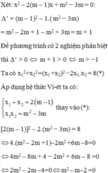Tìm m để pt: x2 - (m - 2)x + m + 5 = 0. có 2 nghiệm x1,x2 thỏa mãn x12 + x22 = 10

Những câu hỏi liên quan
Xác định m để pt có 2 nghiệm x1,x2 thỏa mãn ĐK kèm theo:
x2+(m-1)x + m +6 =0 ( x12 + x22) = 10
Để PT có 2 nghiệm \(\Leftrightarrow\Delta=\left(m-1\right)^2-4\left(m+6\right)\ge0\)
\(\Leftrightarrow m^2-6m-23\ge0\\ \Leftrightarrow\left[{}\begin{matrix}m\le3-4\sqrt{2}\\m\ge3+4\sqrt{2}\end{matrix}\right.\)
Áp dụng Viét: \(\left\{{}\begin{matrix}x_1+x_2=1-m\\x_1x_2=m+6\end{matrix}\right.\)
\(x_1^2+x_2^2=10\\ \Leftrightarrow\left(x_1+x_2\right)^2-2x_1x_2=10\\ \Leftrightarrow\left(1-m\right)^2-2\left(m+6\right)=10\\ \Leftrightarrow m^2-2m+1-2m-12=10\\ \Leftrightarrow m^2-4m-21=0\\ \Leftrightarrow\left[{}\begin{matrix}m=7\left(ktm\right)\\m=-3\left(tm\right)\end{matrix}\right.\Leftrightarrow m=-3\)
Đúng 2
Bình luận (0)
cho pt : x2 - 4x + m + 1 = 0
a.Giải pt khi m=2
b.tìm giá trị của m để pt có 2 nghiệm x1,x2 thỏa mãn đẳng thức x12+x22=5(x1+x2)
a)
Thế m = 2 vào phương trình được: \(x^2-4x+2+1=0\Leftrightarrow x^2-4x+3=0\)
nhẩm nghiệm có a + b + c = 0 (1 - 4 + 3 = 0) nên: \(x_1=1,x_2=\dfrac{c}{a}=\dfrac{3}{1}=3\)
Vậy phương trình có tập nghiệm \(S=\left\{1;3\right\}\)
b) \(\Delta'=\left(-2\right)^2-\left(m+1\right)=4-m-1=3-m\)
Để phương trình có 2 nghiệm thì \(\Delta'\ge0\Leftrightarrow3-m\ge0\Rightarrow m\le3\)
Theo vi ét có \(\left\{{}\begin{matrix}x_1+x_2=4\\x_1x_2=m+1\end{matrix}\right.\)
Theo đề: \(x_1^2+x_2^2=5\left(x_1+x_2\right)\)
\(\Leftrightarrow\left(x_1+x_2\right)^2-2x_1x_2-5\left(x_1+x_2\right)=0\)
\(\Leftrightarrow4^2-2\left(m+1\right)-5.4=0\)
\(\Leftrightarrow16-20-2m-2=0\)
\(\Leftrightarrow-6-2m=0\Rightarrow m=-\dfrac{6}{2}=-3\) (thỏa mãn)
Vậy m = -3 là giá trị cần tìm.
Đúng 4
Bình luận (0)
a: Khi m=2 thì pt sẽ là x^2-4x+3=0
=>x=1; x=3
b: =>(x1+x2)^2-2x1x2-5(x1+x2)=0
=>4^2-2(m+1)-5*4=0
=>-4-2(m+1)=0
=>m+1=-2
=>m=-3
Đúng 0
Bình luận (0)
Cho pt (m+1)x2-2(m-1)x+m-20a, Xác định m để pt có 2 nghiệm phân biệtb, Xác định m để pt có một nghiệm bằng 2. Tìm nghiệm kiac, Xác định m để pt có 2 nghiệm x1; x2 thỏa mãn 1/x1 + 1/x2 7/4; 1/x1 + 1/x2 1; x12+x222d, Xác định m để pt có 2 nghiệm thỏa mãn 3(x1+x2)5x1x2
Đọc tiếp
Cho pt (m+1)x2-2(m-1)x+m-2=0
a, Xác định m để pt có 2 nghiệm phân biệt
b, Xác định m để pt có một nghiệm bằng 2. Tìm nghiệm kia
c, Xác định m để pt có 2 nghiệm x1; x2 thỏa mãn 1/x1 + 1/x2 = 7/4; 1/x1 + 1/x2 = 1; x12+x22=2
d, Xác định m để pt có 2 nghiệm thỏa mãn 3(x1+x2)=5x1x2
tìm các giá trị của m để pt x2-2mx+1=0 có nghiệm x1,x2 thỏa mãn x12 + x22 =8
PT có 2 nghiệm phân biệt`<=> \Delta' >0`
`<=> m^2-1>0`
`<=> m<-1 ; 1 <m`
Viet: `x_1+x_2=2m`
`x_1x_2=1`
Theo đề: `x_1^2+x_2^2=8`
`<=> (x_1+x_2)^2-2x_1x_2=8`
`<=> 4m^2-2=8`
`<=> 4m^2 - 10=0`
`<=>` \(\left[{}\begin{matrix}m=\dfrac{\sqrt{10}}{2}\\m=-\dfrac{\sqrt{10}}{2}\end{matrix}\right.\)
Vậy `m=\pm \sqrt10/2`.
Đúng 3
Bình luận (3)
`x_1^2+x_2^2 = (x_1^2+2x_1x_2+x_2^2)-2x_1x_2 = (x_1+x_2)^2-2x_1x_2`
Đúng 0
Bình luận (0)
Cho phương trình ẩn x: x2 - 2(m+1)x + m2 - 1 = 0 . Tìm giá trị của m để phương tình có 2 nghiệm x1 x2 thỏa mãn x12 + x22 = x1.x2 + 8
Lời giải:
Để PT có 2 nghiệm $x_1,x_2$ thì:
$\Delta'=(m+1)^2-(m^2-1)>0\Leftrightarrow 2m+2>0\Leftrightarrow m>-1$
Áp dụng định lý Viet:
$x_1+x_2=2(m+1)$ và $x_1x_2=m^2-1$
Khi đó, để $x_1^2+x_2^2=x_1x_2+8$
$\Leftrightarrow (x_1+x_2)^2-2x_1x_2=x_1x_2+8$
$\Leftrightarrow (x_1+x_2)^2=3x_1x_2+8$
$\Leftrightarrow 4(m+1)^2=3(m^2-1)+8$
$\Leftrightarrow m^2+8m-1=0$
$\Leftrightarrow m=-4\pm \sqrt{17}$. Vì $m>-1$ nên $m=-4+\sqrt{17}$
Đúng 2
Bình luận (0)
Bài 1: Cho pt ẩn x:x2 - 2(m + 1)x + m2 + 7 0 (1)a) Giải pt (1) khi m -1; m 3.b) Tìm m để pt (1) có nghiệm là 4. Tìm nghiệm còn lại. c) Tìm m để pt (1) có 2 nghiệm x1, x2 thỏa: * x12 + x22 0 * x1 - x2 0Bài 2: Cho pt ẩn x:x2 - 2x - m2 - 4 0 (1)a) Giải pt (1) khi m -2.b) Tìm m để pt (1) có 2 nghiệm x1, x2 thỏa mãn: * x12 + x22 20 * x13 + x23 56 * x1 - x2 10
Đọc tiếp
Bài 1: Cho pt ẩn x:
x2 - 2(m + 1)x + m2 + 7 = 0 (1)
a) Giải pt (1) khi m = -1; m = 3.
b) Tìm m để pt (1) có nghiệm là 4. Tìm nghiệm còn lại.
c) Tìm m để pt (1) có 2 nghiệm x1, x2 thỏa:
* x12 + x22 = 0
* x1 - x2 = 0
Bài 2: Cho pt ẩn x:
x2 - 2x - m2 - 4 = 0 (1)
a) Giải pt (1) khi m = -2.
b) Tìm m để pt (1) có 2 nghiệm x1, x2 thỏa mãn:
* x12 + x22 = 20
* x13 + x23 = 56
* x1 - x2 = 10
Bài 1:
a, Thay m=-1 vào (1) ta có:
\(x^2-2\left(-1+1\right)x+\left(-1\right)^2+7=0\\
\Leftrightarrow x^2+1+7=0\\
\Leftrightarrow x^2+8=0\left(vô.lí\right)\)
Thay m=3 vào (1) ta có:
\(x^2-2\left(3+1\right)x+3^2+7=0\\ \Leftrightarrow x^2-2.4x+9+7=0\\ \Leftrightarrow x^2-8x+16=0\\ \Leftrightarrow\left(x-4\right)^2=0\\ \Leftrightarrow x-4=0\\ \Leftrightarrow x=4\)
b, Thay x=4 vào (1) ta có:
\(4^2-2\left(m+1\right).4+m^2+7=0\\ \Leftrightarrow16-8\left(m+1\right)+m^2+7=0\\ \Leftrightarrow m^2+23-8m-8=0\\ \Leftrightarrow m^2-8m+15=0\\ \Leftrightarrow\left(m^2-3m\right)-\left(5m-15\right)=0\\ \Leftrightarrow m\left(m-3\right)-5\left(m-3\right)=0\\ \Leftrightarrow\left(m-3\right)\left(m-5\right)=0\\ \Leftrightarrow\left[{}\begin{matrix}m=3\\m=5\end{matrix}\right.\)
c, \(\Delta'=\left[-\left(m+1\right)\right]^2-\left(m^2+7\right)=m^2+2m+1-m^2-7=2m-6\)
Để pt có 2 nghiệm thì \(\Delta'\ge0\Leftrightarrow2m-6\ge0\Leftrightarrow m\ge3\)
Theo Vi-ét:\(\left\{{}\begin{matrix}x_1+x_2=2m+2\\x_1x_2=m^2+7\end{matrix}\right.\)
\(x_1^2+x_2^2=0\\ \Leftrightarrow\left(x_1+x_2\right)^2-2x_1x_2=0\\ \Leftrightarrow\left(2m+2\right)^2-2\left(m^2+7\right)=0\\ \Leftrightarrow4m^2+8m+4-2m^2-14=0\\ \Leftrightarrow2m^2+8m-10=0\\ \Leftrightarrow\left[{}\begin{matrix}m=1\left(ktm\right)\\m=-5\left(ktm\right)\end{matrix}\right.\)
\(x_1-x_2=0\\ \Leftrightarrow\left(x_1-x_2\right)^2=0\\ \Leftrightarrow\left(x_1+x_2\right)^2-4x_1x_2=0\\ \Leftrightarrow\left(2m+2\right)^2-4\left(m^2+7\right)=0\\ \Leftrightarrow4m^2+8m+4-4m^2-28=0\\ \Leftrightarrow8m=28=0\\ \Leftrightarrow m=\dfrac{7}{2}\left(tm\right)\)
Đúng 2
Bình luận (0)
Bài 2:
a,Thay m=-2 vào (1) ta có:
\(x^2-2x-\left(-2\right)^2-4=0\\ \Leftrightarrow x^2-2x-4-4=0\\ \Leftrightarrow x^2-2x-8=0\\ \Leftrightarrow\left[{}\begin{matrix}x=4\\x=-2\end{matrix}\right.\)
b, \(\Delta'=\left(-m\right)^2-\left(-m^2-4\right)\ge0=m^2+m^2+4=2m^2+4>0\)
Suy ra pt luôn có 2 nghiệm phân biệt
Theo Vi-ét:\(\left\{{}\begin{matrix}x_1+x_2=2\\x_1x_2=-m^2-4\end{matrix}\right.\)
\(x_1^2+x_2^2=20\\ \Leftrightarrow\left(x_1+x_2\right)^2-2x_1x_2=20\\ \Leftrightarrow2^2-2\left(-m^2-4\right)=20\\ \Leftrightarrow4+2m^2+8-20=0\\ \Leftrightarrow2m^2-8=0\\ \Leftrightarrow m=\pm2\)
\(x_1^3+x_2^3=56\\ \Leftrightarrow\left(x_1+x_2\right)^3-3x_1x_2\left(x_1+x_2\right)=56\\ \Leftrightarrow2^3-3\left(-m^2-4\right).2=56\\ \Leftrightarrow8-6\left(-m^2-4\right)-56\\ =0\\ \Leftrightarrow8+6m^2+24-56=0\\ \Leftrightarrow6m^2-24=0\\ \Leftrightarrow m=\pm2\)
\(x_1-x_2=10\\ \Leftrightarrow\left(x_1-x_2\right)^2=100\\ \Leftrightarrow\left(x_1+x_2\right)^2-4x_1x_2-100=0\\ \Leftrightarrow2^2-4\left(-m^2-4\right)-100=0\\ \Leftrightarrow4+4m^2+16-100=0\\ \Leftrightarrow4m^2-80=0\\ \Leftrightarrow m=\pm2\sqrt{5}\)
Đúng 0
Bình luận (0)
Cho phương trình:
x
2
– 2(m – 1)x +
m
2
− 3m 0. Tìm m để phương trình có 2 nghiệm phân biệt
x
1
;
x
2
thỏa mãn
x
1
2
+
x
2
2
8
A. m 2 B....
Đọc tiếp
Cho phương trình: x 2 – 2(m – 1)x + m 2 − 3m = 0. Tìm m để phương trình có 2 nghiệm phân biệt x 1 ; x 2 thỏa mãn x 1 2 + x 2 2 = 8
A. m = 2
B. m = −1
C. m = −2
D. m = 1
cho pt 2x2 - ( m + 1 )x - 6 = 0
tìm m để pt có 2 nghiệm x1 x2 thỏa mãn x12 + x2 = -2
x1^2+x2^2=(x1+x2)^2-2x1x2
=((m+1)/2)^2-2*(-6/2)
=1/4(m^2+2m+1)+6
=>x1^2=1/4m^2+1/2m+25/4-x2^2
x1^2+x2=-2
=>1/4m^2+1/2m+25/4-x2^2+x2=-2
=>-x2^2+x2+1/4m^2+1/2m+33/4=0
=>x2^2-x2-1/4m^2-1/2m-33/4=0
Δ=(-1)^2-4*1*(-1/4m^2-1/2m-33/4)
=1+m^2+2m+33
=(m+1)^2+33>=33
=>Phương trình luôn có m thỏa mãn
Đúng 0
Bình luận (0)
Cho pt:x2-4x+m-2=0 (1)
a) Với giá trị nào của m thì pt (1) có nghiệm kép. Tìm No kép đó.
b) Tìm m để pt (1) có 2 No x1, x2 thỏa mãn hệ thức x12+x22=9
a=1,b=-4,c=m-1
Ta có : △ = b\(^2\)-4ac =16-4(m-2)=16-4m+8
Để PT(1) có nghiệm kép thì △=0 <=> 16-4m+8=0<=> 4m=24<=>m=6
Với m=6 PT(1) <=> x\(^2\)-4x+6-2=0<=>x\(^2\)-4x+4=0
Lại Có m=6 thì pt có nghiệm kép => x\(_1\)=x\(_2\)=-\(\dfrac{b}{2a}\)=2
Vậy Với m=6 thì pt 1 có nghiệm kép x=1
b) Theo hệ thức Vi-et
Ta có: x\(_1\)+x\(_2\)=\(\dfrac{-b}{a}\)=4 và x\(_1\).x\(_2\)=\(\dfrac{c}{a}\)=m-2
x1\(^2\)+x2\(^2\)=9
<=> (x\(_1\)+x\(_2\))\(^2\)-2x\(_1\).x\(_2\)=9
<=>16-2m+4=9
<=>2m=1
<=> m=\(\dfrac{1}{2}\)
Vậy m =\(\dfrac{1}{2}\) thì pt(1) có 2 nghiệm thõa mãn x\(_1\)\(^2\)+ x\(_2\)\(^2\)=9
Đúng 3
Bình luận (3)
Cho phương trình: x2+mx+1=0 (1), m là tham số
a)Giải phương trình (1) khi m=4.
b)Tìm giá trị m để pt (1) có 2 nghiệm x1,x2 thõa mãn: x12/x22 + x22/x12 >7
Xem chi tiết



























